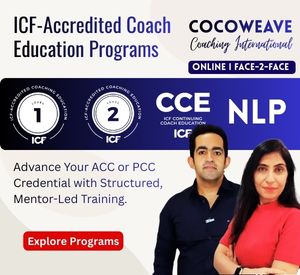While practicing coaching, we come across a wide variety of clients from different education levels, professional backgrounds and personalities. This happens to be one of the most rewarding and enriching parts of the coaching profession. But, what about coaching someone with a similar training to yours and from the same profession: a coach?
Coaching a coach at first seems intimidating since it may raise performance concerns for the coach who facilitates the sessions. While you are managing the process as a coach, someone who knows the techniques and methods of coaching can easily spot what you are doing, why you are doing it and whether you are doing it right. This makes many coaches feel uncomfortable of coaching a coach. Yet, reality is different and often the opposite. Let’s look at some of the elements that shape the experience of coaching a coach.
Coachable or Non-Coachable
For coaching programs to be successful, the client must have a bigger role than the coach has. Whether your client is coachable or not is one of the main identifiers. Forbes lists some of the traits of being coachable as humility, willingness to surrender control and faith. “Humility” here simply means being open to other ideas, willing to learn more and to progress. “Surrendering” is also important when it comes to letting go control and allowing the coach, and the process, to do its course. And finally, “have faith” in the process of coaching rather than only relying on certain outcomes and doing regular checks of outcomes. You may not always find these qualities in your client, but for someone who took coach training and/or actively coaches, they most likely will.
Self-Awareness
Self-awareness is one of the valuable outcomes of coaching programs for clients, such as finding their values, strengths, self-limiting beliefs and thought patterns. As a coach, you may worry that your coach-client already has a high level of self-awareness, so your contribution to this area would be limited. But, on the contrary, high levels of self-awareness fuel coaching sessions.
During the sessions with the coach-clients, I observed that powerful questions unfold their own new ones. Profound insights come out as more of aha! moments occur; self-limiting beliefs and blockages come to the surface more easily and quickly. The higher the self-awareness of the client is, the easier it becomes to facilitate for further awareness to emerge. As a result, coaching sessions become more impactful.
Expectations
Even though the coaching industry is growing and there is increased visibility and coverage about coaching, this doesn’t mean that clients would be knowledgeable about the process. Most often, first-time clients don’t have clarity and have mixed expectations. For instance, some clients expect to receive personal advice, or they focus more on past, childhood issues.
In these cases, it’s the coach’s responsibility to underline the scope and the limits of coaching. Sometimes it may not be enough to clarify this at the beginning, and you may need to touch base along the process a couple of times. It takes time for full alignment, but for coach-clients, this turns out to be a totally different experience, more of a smooth coaching journey from day one due to the contribution of their knowledge on the scope and the limits of coaching.
Sessions
Every profession has its own jargon, which makes it easy and smooth to communicate within the profession but may sound like a foreign language to someone outside the field. This applies to coaching as well, especially the way some of the questions are formed, as they may not click for clients outside of the coaching world. I never forget my experience of this. In the early times of my coaching, when I asked my client “What did you bring today to our coaching session?” she replied in a witty way, “I brought cookies.” Although it was a question just to find out the client’s choice of topic for the day, this experience clearly showed that the question needs to be asked in a clearer way to someone outside the coaching world. On the other hand, while coaching a coach-client, you can use these kinds of questions without the need of elaborating and simplifying.
Even though coaching a coach at first seems intimidating, it has great advantages that makes the coaching sessions smooth, effective, more impactful and successful.
Disclaimer
The views and opinions expressed in guest posts featured on this blog are those of the author and do not necessarily reflect the opinions and views of the International Coach Federation (ICF). The publication of a guest post on the ICF Blog does not equate to an ICF endorsement or guarantee of the products or services provided by the author.
Additionally, for the purpose of full disclosure and as a disclaimer of liability, this content was possibly generated using the assistance of an AI program. Its contents, either in whole or in part, have been reviewed and revised by a human. Nevertheless, the reader/user is responsible for verifying the information presented and should not rely upon this article or post as providing any specific professional advice or counsel. Its contents are provided “as is,” and ICF makes no representations or warranties as to its accuracy or completeness and to the fullest extent permitted by applicable law specifically disclaims any and all liability for any damages or injuries resulting from use of or reliance thereupon.
Authors
Post Type
Blog
Audience Type
Coach Educators, Experienced Coaches, External Coaches, ICF Chapter Leaders, Internal Coaches, New Coaches, Professional Coaches, Team and Group Coaches
Topic
Coaching Toolbox, Discover - Your Coaching Career
Related Posts
The Power of Active Listening in Meaningful Coaching: Why Active Listening is the Most Essential Coaching Competency
Of all the foundational coaching competencies identified by the International Coaching Federation…
Allyship in Action: Coaching as a Catalyst for Change
Allyship is often framed as a value or an intention. In practice,…
Grace Under Fire: Building Stress Resilience for Coaches and High Achievers
There’s a unique kind of pressure that lives at the intersection of…







